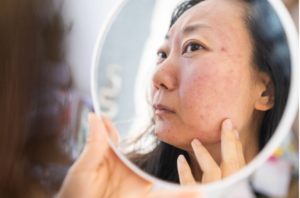Are you upset with persistent black spots on your skin that refuse to go away despite your best efforts? Or do you feel like you’ve tried everything and the black spots just won’t go away? If you have hyperpigmentation, you are undoubtedly wondering how long it would take for the discolourations to erase. Unfortunately, the answer is not straightforward.
Understanding Different Types of Pigmentation
Because there are different forms of skin pigmentation, the time it takes to fade varies. Here are some frequent forms:
Melasma: This type of skin pigmentation shows as dark patches on the face and is caused by hormonal swings such as pregnancy or birth control pills.
Post-Inflammatory Hyperpigmentation (PIH): These are dark spots that appear after skin inflammation or injury, such as acne or other skin injuries.
Sunspots: Chronic sun exposure causes solar lentigines, often known as age spots.
Factors influencing hyperpigmentation
Understanding what causes hyperpigmentation is essential. Several things contribute to its growth:
The Sun’s Impact
Prolonged and unprotected sun exposure is the leading cause. UV rays stimulate melanin formation as a defensive strategy. Overproduction can cause dark spots and uneven skin tone, thus using sunscreen every day is vital
Hormonal Fluctuations
Changes in hormone levels can have a substantial impact on skin pigmentation. Melasma is more common in women because of hormonal changes during pregnancy or while taking hormonal birth control.
Inflammation and Injury
Skin damage, such as acne, eczema flare-ups, or physical injuries such as cuts and burns, can cause hyperpigmentation because the skin produces excess melanin while it heals.
Realistic Timelines
While timescales can vary widely, here are some realistic estimates for how long certain forms of pigmentation might take to fade:
Mild hyperpigmentation:such as some PIH patches, can resolve after 3 to 6 months of regular therapy.
Sun spots: With targeted therapy, they often vanish within 3-6 months.
Melasma: Caused by hormonal swings, it can take a year or more with persistent management.
Deep PIH: Severe cases can take a year or more to fade.
Why Is Your Pigmentation Not Fading?

If you believe your hyperpigmentation is not receding, it could be due to the following factors:
Not Applying Sunscreen
Sunscreen is the most effective way to prevent hyperpigmentation. UV light increases melanin production, which can darken your spots. As a result, avoiding sunscreen can make it more difficult to remove existing spots.
Creating new trauma
Picking or scratching at patches can cause fresh inflammation and PIH, increasing the time it takes to dissipate. To help with the fading process, avoid picking or irritating your skin.\
Impatience
Active components in skincare require time to produce benefits. You cannot expect to see results overnight, and you must be diligent in using them to fade the spots. For the best outcomes, the process takes time, patience, and consistency.
Effective Methods to Remove Pigmentation
Consider the following strategies to help your spots vanish faster:
Consistent sun protection
To guard against UV rays that worsen pigmentation, apply a broad-spectrum sunscreen on a daily basis. To maintain good protection and prevent new spots, reapply every two hours, particularly after exposure to water or perspiration.
Topical Treatments
Use skincare products containing retinoids, vitamin C, niacinamide, hydroquinone, or azelaic acid. These ingredients assist to increase cell turnover, decrease melanin synthesis, and even out skin tone, making them very useful in your evening routine.
In-clinic treatments
Consider professional treatments such as chemical peels, microdermabrasion, dermaplaning, microneedling, and laser therapy. These treatments target deeper pigmentation by eliminating top layers or breaking down melanin, making them ideal for more resistant instances.
Conclusion
Fading pigmentation necessitates patience and dedication. Consistency and patience are essential for producing the greatest results. If you’re ready to take the next step towards clearer skin, consider booking a free online consultation to discuss the best approach for your needs.

